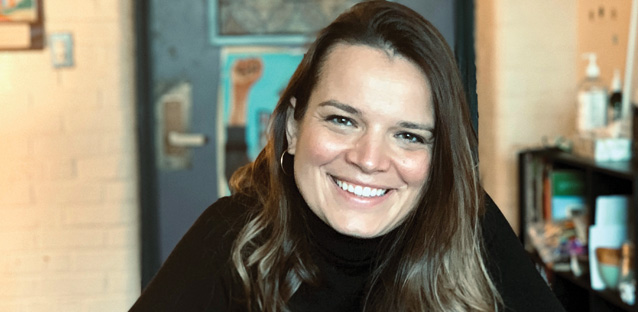Vanja Pejic, Ph.D., ’16, School Psychology, found her true calling when she was a graduate student at UNC. A refugee from Bosnia when she was a child, Pejic is an attending psychologist at Boston Children’s Hospital and an instructor at Harvard Medical School. She provides school mental health services for newly arrived immigrant and refugee youth for the Boston Children’s Hospital Neighborhood Partnerships program as well as supports community consultation and training on refugee and immigrant mental health through the Trauma and Community Resilience Center at Boston Children’s Hospital. Here’s her story about how she found her passion at UNC, as told by Pejic.
I was 10 when my family came to the U.S. as refugees from Bosnia. At the time, there were really no services for immigrant and refugee students in our area. My brother and I were the only refugees in our school. Going through the journey of acculturating into a new community, and then, later, working with immigrant and refugee student populations — many with complex mental health needs not being addressed — allowed me to understand how under-resourced and under-supported behavioral health systems were in supporting and treating these populations.
I came to UNC after I spoke with Dr. Robyn Hess. At the time, she was doing work with migrant communities and school mental health disparities. Our visions aligned. I will never forget, in my first year at UNC, I was doing a clinical practicum at a high school in Greeley when I was invited to talk with a classroom of newly arrived immigrant refugee students. I remember thinking, these are high school students, what do they care about this person sitting in front of the room speaking English? They were rambunctious and talking to each other, and I noticed a young man in the back of the room that just was not paying attention to what I had to say. Until, as I was introducing myself, I said, ‘I, too, am a refugee,’ and he stopped and looked up at me, and I saw a tear come down his face. It was a realization, among many in my life, that there was something I could contribute to this community. Despite our two very different life stories and experiences, he and I shared a mutual understanding of what it meant to be a refugee in the U.S.
From then on, all my work centered around refugee populations. I felt a deep calling and connection to this community. It’s so important to continue to create points of visibility for immigrant and refugee communities that often experience so many hardships and barriers, from leaving their home countries to the process of resettlement. Too often the stories we tell of them focus on things that are wrong within these communities. I love the idea of being able to cultivate a different narrative, to bring change to how we understand and talk about refugee and immigrant populations and, instead, see them for the resiliency, diversity and strength they bring to our communities.
I love the duality of providing direct clinical care as well as being involved in research and teaching, because the immigrant and refugee youth and families I work with keep me grounded in my mission and purpose. For real systemic change to happen, I believe it starts by giving voice and power back to the refugee and immigrant communities.
I did not believe getting a doctoral degree was even a possibility for me. I’m the first person in my family to receive a Ph.D. Even the idea of graduate school was a distant concept until I was able to get a graduate assistantship that allowed me to pay for my graduate tuition. Opening the door for me to pursue my passion started with having financial support for individuals like myself. UNC was tremendous in allowing and creating spaces for people that shared stories like mine. Dr. Hess was instrumental in being an anchor for me, guiding and mentoring me every step of the way.
It all started at UNC. I had incredible faculty, mentorship and teaching, not just Dr. Hess, but the entire faculty within the School Psychology program that truly took the time to create and hone my passions and skill set. What a gift it was to be allowed, as a young person who’s coming into their own, to have the backing of this community and support, whether it’s financial, mentorship, education or training. The UNC community believed in me far more than I believed in myself at times, of what was possible or what was to come.
—Vanja Pejic, Ph.D. ’16, as told to Amber Medina


